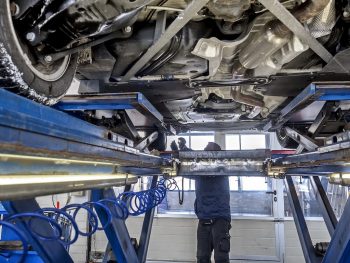Majority of drivers opposed to MOT changes
New research showing that drivers are against radical new changes to the MOT, mooted by the Department for Transport in a current consultation.

67% of UK car owners support keeping first MOT test at three years rather than extending to four, the SMMT has found
Open until 11:45pm on 22 March 2023, the consultation explores changing the date of the first test from three years to four years and switching from 12 to 24 months for follow-up tests, in order “to balance costs on motorists”.
Motor industry stakeholders have already spoken out, saying that delaying the first MOT would increase the number of dangerous vehicles on UK roads without reducing the cost of motoring – and have launched a petition against the plans.
Two new pieces of research indicate that drivers are not supportive of the changes either.
A Savanta poll of British car owners, published by the Society of Motor Manufacturers and Traders (SMMT), saw 67% say they were concerned that extending the MOT would put lives in danger, with three-quarters (74%) agreeing that the typical £35-£45 cost of a test is a price worth paying for the peace of mind it provides that their car is safe and roadworthy.
Some nine in 10 respondents to the survey (87%) said they would prefer other ways to save money, for example, a reduction in VED or a cut in fuel duty, over a delay in a safety check of their vehicle. Moreover, given the survey found that 66% of respondents spend more than the typical price of an MOT in fuel alone over just two weeks, it would take a cut in fuel duty of between a fifth and a quarter of a penny to deliver the same total saving across all motorists, not just those with relatively new cars.
The SMMT has also pointed out that more than 300,000 vehicles fail their first MOT through failure to meet minimum safety requirements, with fails frequently associated with tyres, brakes, lights and suspension.
And the survey reveals just how heavily drivers rely on the MOT and aftermarket, service and repair sectors for checks on these common faults. Nearly a quarter (23%) don’t regularly check that their brakes are working correctly, almost a fifth (19%) whether their tyres are okay (which should be done monthly), and 17% that their lights and indicators are functioning. These three areas accounted for nearly a quarter of a million failure items alone in 2022.
The data also shows that seven in 10 motorists usually get their car serviced at the same time as their MOT. With the cost of living increasing, however, more than a third of drivers now say they will reduce spending on car maintenance. This reinforces the importance of keeping MOT frequency at three years, and annually thereafter, to help drive regular vehicle servicing.
SMMT chief executive Mike Hawes said: “The MOT is a crucial component in keeping the UK’s vehicles and roads safe. Our survey shows that drivers support the existing MOT frequency and that there is little appetite to change it, despite the increased cost of living.
“If changes to the MOT are to be made, these should enable testing of advanced electrified powertrains, driver assistance technologies and connected and automated features, as drivers value the peace of mind the MOT offers.”
Modernise requirements but don’t change frequency, says AA
The AA has also published a poll showing that more than three-quarters of drivers (77%) do not wish to change the annual MOT to every 24 months.
Its survey of more than 14,500 drivers also found that more than nine out of 10 (92%) say that an annual MOT plays a key role in keeping dangerous vehicles off the road. Three-quarters (75%) of drivers said that the with the advancement of driver assistance and varying levels of autonomous technology being introduced on cars these too should form part of the annual test.
The AA’s submission to the consultation argues against changing the frequency of testing but supports modernising the requirements of the MOT.
Jack Cousens, head of roads policy, said: “On safety grounds alone, it would be foolish to move away from an annual test and indeed moving the first MOT to four years as many cars show up with brake or tyre defects in that period.
“Modernising and future-proofing the MOT is a natural next step and will help give consumers confidence should they purchase an electric car, one with highly complex driver assistance packages or indeed a connected car.”
The AA’s research also shows a fifth (20%) of drivers believe it is worth investigating if MOTs can be carried out away from garages in an effort to help drivers stay on the road.
“In the future we believe that various aspects of the MOT could be carried out remotely using connected car technology,” added Cousens.














